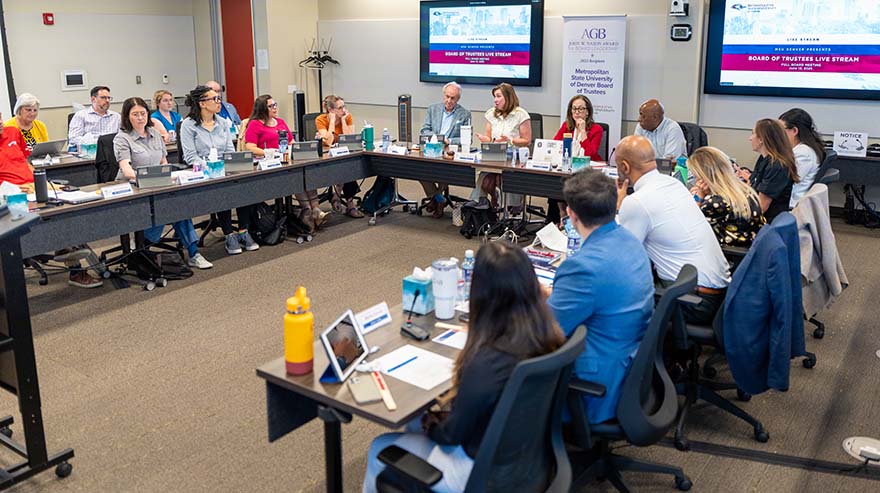Accessibility has always been a core value at Metropolitan State University of Denver, but new state and federal laws are driving even greater action to ensure that no student, employee or visitor is left out when engaging with digital content.
Colorado House Bill 21-1110 requires all public universities and agencies to make their websites, mobile apps and digital content accessible to people with disabilities by July 1. Institutions must meet a clear set of standards that ensure easier access for users with different abilities.
For example, PDF documents without selectable text or accessibility tags must be updated to include a real-text layer, proper reading order, headings and alternative text for images. Microsoft Word documents, social-media posts, slide-show presentations, video content, email and more must also meet accessibility requirements.
Similarly, a new federal rule under the Americans With Disabilities Act took effect last June 24, with a compliance deadline of April 24, 2026. Like the state law, it focuses on creating inclusive, user-friendly online environments.
Accessibility Task Force leads the way
To prepare for these changes, MSU Denver last fall formed an Accessibility Task Force, co-chaired by Michelle Britt, director of Digital Marketing and Content Strategy, and Shaun Schafer, associate vice president for Curriculum and Policy Development.
The group recommended action across four key pillars:
- Training: educating faculty and staff about accessibility requirements.
- Remediation: updating existing digital materials to meet standards.
- Procurement: integrating accessibility into vendor selection and agreements.
- Policy: updating University policies to reflect new expectations.
The task force presented four tiers, based on budget allocation, with the primary recommendation at the highest level. The recommendations are under review by senior leaders, and potential cost-sharing options are being explored.
Mandatory training for faculty members
Meanwhile, Academic Affairs, with the support of the Center for Teaching, Learning and Design, has developed a short online course, Digital Accessibility Made Simple. This training, available on Canvas, is mandatory for all faculty members who plan to teach in upcoming semesters. It introduces the basics of creating accessible digital materials through a series of short videos and helpful resource links.
The course can be completed in about two hours if done in one sitting, but participants also have the option to work at their own pace. Progress is automatically saved in the Canvas platform, allowing for flexibility over multiple sessions. Once the training is completed, Academic Affairs will formally record it.
Faculty members who plan to teach during summer must complete the course by May 23. Faculty members who do not plan to teach until fall have a deadline of Aug. 13. Since the course launched March 20, over 170 faculty members have completed it.
Training for staff members may be introduced. Meanwhile, all employees can find more accessibility resources below:
- CTLD: Instructional Accessibility Guides & Resources (while these resources are designed specifically for faculty, other staff may find them useful)
- Governor’s Office of Information Technology (OIT): Accessibility Resources
Audit improves MSU Denver’s online presence
University Communications and Marketing is working with Ablr, a nonprofit specializing in accessibility, to audit and improve accessibility across MSU Denver’s centralized platforms. Included are the University’s main website, videos, social media and editorial content.
The team is on track to remediate 90% of serious or critical issues by June 30.

“This audit ensures that the UCM Department sets the standard for website accessibility and serves as a model for others,” Britt said. “Focusing on the website in particular ensured that all website modules across offices and departments were prioritized in this first round of action.”
Site Improve Reports were developed to identify where content updates were needed to meet accessibility standards across the website. The Digital Strategy team has been communicating with web authors regarding these updates for the past year. For questions or assistance related to this work, submit an intake request.
What’s next?
The Governor’s Office of Information Technology is expected to release additional details regarding requirements in the next month. MSU Denver will leverage guidance to inform future action and share expectations with employees. In the meantime, employees should consider evaluating existing materials for accessibility and implementing updates where possible.
The new state law stipulates financial penalties for noncompliance, but if the University incurs any fines after the July 1 deadline, the Colorado Office of Risk Management will cover the costs; MSU Denver will not be liable.
“The goal is not immediate perfection but demonstrating a ‘best effort’ and building systems to support accessibility long-term,” said Britt.
For more details or to report an issue, visit the Accessibility site.








